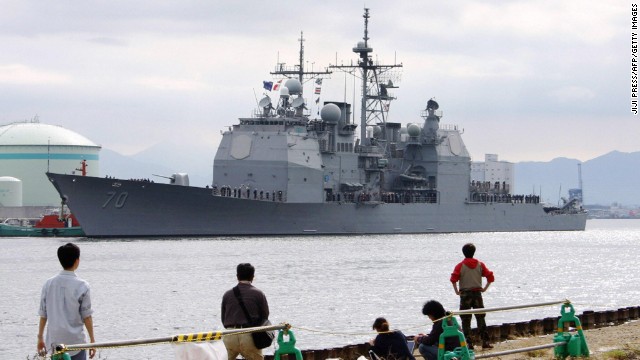Patriot missiles believed to have arrived
The Japan Times ^ | October 12, 2006 | Japan Times Staff
CARGO UNLOADED UNDER TIGHT SECURITY
NAHA, Okinawa Pref. (Kyodo) U.S. forces transferred Wednesday what is believed to be missiles for a U.S.-led missile defense system from a freighter in Urama, Okinawa, to the U.S. Air Force Kadena Ammunition Storage Area in the prefecture.
On Wednesday morning, U.S. service members and other workers unloaded the cargo, which arrived Monday, after police cleared the route of civic groups that had blocked the road in protest of the deployment of the Patriot Advanced Capability-3 interceptor system.
The United States plans to begin partial operation of the PAC-3 system at the U.S. Kadena Air Base and the Kadena Ammunition Storage Area by the end of December, deploying all 24 missiles in the system, according to the U.S. military.
While the cargo was being transferred onto dozens of trailers from the freighter at the U.S. Navy's Tengan Pier in Uruma, members of civic groups shouted from outside the pier's gate, "We will not allow the PAC-3 system to be deployed in Okinawa."
Meanwhile, Yoritaka Hanashiro, head of the executive office of Gov. Keiichi Inamine, expressed the office's displeasure, saying the U.S. government had not given a sufficient reason to the public for the missile defense system's deployment in the prefecture.
"Deploying the PAC-3 system before definite steps are taken to reduce the burden of the Kadena Base cannot win the understanding of local people, and it is regrettable," Hanashiro told a prefectural assembly session about the U.S. bases.
The missiles are being deployed as part of the agreement reached in May between the central government and Washington on the realignment of the U.S. military in Japan.
The PAC-3 system is designed to intercept incoming ballistic missiles in their final phase, once they have re-entered the Earth's atmosphere and have descended to altitudes of just over 12 km, according to Japanese officials.
The move came just days after North Korea declared it had conducted a nuclear test Monday. In July, Pyongyang also test-fired seven missiles into the Sea of Japan.
Don't dally: Nakagawa
Kyodo News Liberal Democratic Party Secretary General Hidenao Nakagawa said Wednesday that Japan should expedite efforts to set up a missile defense system in connection with North Korea's announcement Monday that it conducted an underground nuclear test.
Speaking at the Japan National Press Club in Tokyo, Nakagawa also denied the possibility that the country would pursue nuclear arms, backing Prime Minister Shinzo Abe's remarks to that effect made during an Upper House Budget Committee session Tuesday.
Nakagawa also hailed Abe's summits Sunday and Monday with Chinese and South Korean leaders, saying the talks made it possible for Japan to mend soured ties with its neighbors and pave the way for mutually beneficial ties.
No Japan nukes: Rice
WASHINGTON (Kyodo) U.S. Secretary of State Condoleezza Rice on Tuesday dismissed suggestions that Japan might develop nuclear weapons in the wake of North Korea's atomic test, saying she trusts Tokyo as a security partner.
"There's no evidence that this is a position that has any particular purchase in the Japanese system, or certainly among the Japanese population," Rice said in an interview on Fox News.
Rice made the comments when asked about suggestions by U.S. experts and lawmakers that Monday's nuclear test by North Korea could lead to a nuclear arms race in Asia, with Japan and South Korea going nuclear in response.
Some have even advocated holding out the threat of a nuclear Japan as a way to pressure China into pushing North Korea to abandon its nuclear program.
"I don't think there's anybody that really thinks changing the nuclear balance in Northeast Asia by having Japan go nuclear would improve the security situation," Rice said.
"We trust the Japanese. They're our security partner."
But Rice acknowledged that North Korea's emergence as a nuclear power "could set off all kinds of effects in the region," which is one reason why China has condemned the test and accepted possible U.N. sanctions against the North.
The Japan Times (C) All rights reservedArticle 2 of 10 in National news
Photo: Police guard the road Wednesday morning outside the U.S. Navy's Tengan Pier as a truck loaded with what is believed to be Patriot Advanced Capability-3 missiles heads for the U.S. Air Force Kadena Ammunition Storage Area. KYODO PHOTO




 Reply With Quote
Reply With Quote



Bookmarks